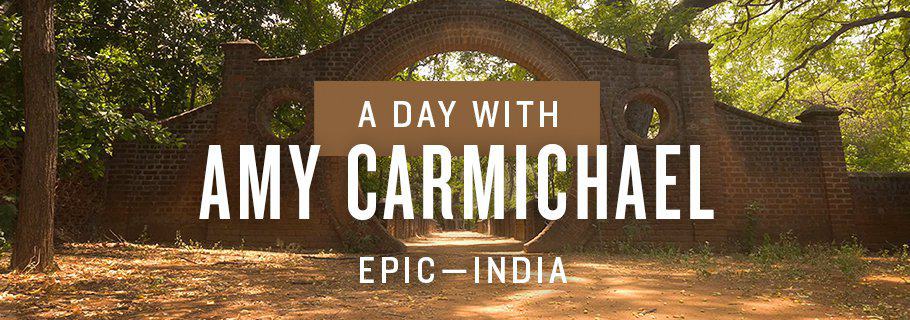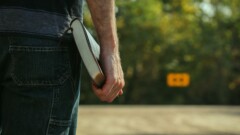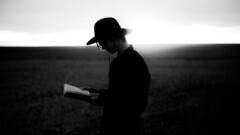Nine months into my round-the-world EPIC journey, I finally visited India where I was able to spend a day at Dohnavur Fellowship, the incredible organization founded by Amy Carmichael. Here is a little bit of what I saw and experienced.
This video was sponsored by Zondervan, and they would like you to know about the new book Know How We Got Our Bible by Ryan Reeves and Charles Hill.
If you’ve never read a biography of Amy Carmichael, perhaps consider this one by Iain Murray or this one by Elisabeth Elliot. You can’t go wrong either way!
Transcript
Tim: Just throw it in my… or do I throw it in here and just chug this?
Cameraman: I think you put the coffee in and you chase it with the water.
Tim: Put it in my mouth?
Cameraman: Yes, down your throat.
Tim: That was not delicious.
Cameraman: I’m impressed.
Tim: But it’s in.
This video is made possible in part by Zondervan and their new book, Know How We Got Our Bible, by Ryan Reeves and Charles Hill. This is the newest volume in the excellent Know Series edited by Justin Holcomb and I’ll tell you more about it in just a moment.
Tim: We’ve just arrived at Dohnavur Fellowship here in the far south of India. This is the place Amy Carmichael brought into existence through prayer, you could say. She served here for many years. She died here. And she has left behind this incredible legacy, I’m so excited to go and explore it.
Tim: Okay, right. And then, on the property, there’s still children living here?
Man: Yeah, 200, but now there are a lot of restrictions. Until 2002, we were able to take children from babies, 1-day babies, even 2-day babies. But now from 2002, government has restricted it that allows us to take children only from the age of 5. Until then we were taking from all over India.
Man: And in different parts of the world we are able to shine as witnesses for Christ.
Tim: Right. Oh, okay. So, all of this, she saw? All of this was built under her? Okay.
Man: Yes. Actually, most of the construction was over by the 1950’s.
Tim: Okay. She died in, is it 1951?
Man: 1951, yes.
Tim: Right, okay. And when did she first settle here?
Man: Actually, she came through this village in 1902.
Tim: 1902? Okay.
Man: Nineteen zero zero.
Tim: Oh, 1900. Okay.
Tim: These are the living quarters where she stayed for many, many years. Many of her personal effects are still here. Her library is still here and I believe largely intact. It’s interesting to go through. She was a voracious reader and read across many, many topics. Of note, there’s lots of commentaries, lots of Bible works. And then there’s also quite a lot of biographies. She seemed to enjoy reading biographies of many of the great missionaries.
Coming around, there’s this painting here of the Matterhorn and apparently, she especially appreciated a metaphor related to mountains which is: Sometimes life’s trials seem too difficult to endure, and yet just as somebody eventually prevailed and climbed the mountain, so we too can endure and overcome, through Christ’s help, the trials we endure.
She spent her later years bedridden and you can actually see a mark on the ground there where the post of the cot was. But above her bed then she had these promises that were very precious to her. She would meditate on them, pray and claim those promises to sustain her through very, very difficult days.
Woman: When I came here, I was an 8-day old baby. Amma’s child.
Tim: Oh, really?
Woman: I was born in 1948.
Tim: 1948, okay.
Woman: Amma died in 1951.
Tim: ’51, right. So, three years old.
Woman: Amma gave me the name that means flower.
Tim: Oh, really? She gave you your name?
Woman: In 1924 Amma started to build this church.
Tim: Okay. So, Amy built this, or Amy oversaw this being built? Wow. She was an ambitious person.
Tim: Wonderful. Beautiful.
Woman: Easter Sunday morning, the whole family will come here.
Tim: Yes. Oh, okay.
Woman: You know the story about Prina?
Tim: I know the story of Prina, yes.
Woman: She’s called Amma.
Tim: Okay.
Woman: So Amma likes to call her children Amma.
Tim: Okay. Amma is mum, right? Mummy?
Woman: Mother.
Tim: Mother. Right. So, if we go around here and we see a child, they’ll be saying amma to their mother? Okay. And it’s very similar in almost every language, has ma, mum, mother, yes. Every language has the same word. Because it’s the first one baby’s can make, right? Mama.
Tim: It was her wish that she be buried in an unmarked grave, she be buried even without a coffin. They did not put her in a coffin, but they did choose to mark the grave with a simple bird bath. She had a great love for nature, a great love for animals, for birds. So, they put a bird bath here with her name and the date of her death on it. And every day they come out and the put water in it to ensure the birds can still enjoy this spot.
As Christians, we read our Bibles and study our Bibles and love our Bibles, but maybe we don’t think too much about how we got them in the first place. In, Know How We Got Our Bible, Ryan Reeves, and Charles Hill walk readers through the history of the Bible, covering how and when it’s books were written, the formation of the old and new testaments and finally the translation efforts that have led to our modern versions today. This short book makes a perfect introduction for those thinking about it for the first time and an excellent refresher for those who have thought about it all before. You can buy it wherever great books are sold. For more information visit Zondervan.com.










